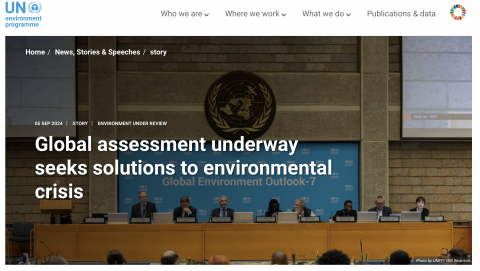
GCED Basic Search Form
Quick Search
현재 위치
뉴스

About 250 environmental scientists are gathering this week in Nairobi, Kenya, to discuss an advanced draft of the latest Global Environment Outlook, a landmark report expected to showcase solutions to some of the planet’s most-pressing environmental challenges. The United Nations Environment Programme (UNEP) has issued a call to enlist reviewers from around the world, and ensure the report presents robust science and peer-reviewed evidence and data.
This will be the seventh edition of the report, known as GEO-7, since 1995. The series has become a go-to scientific resource for policymakers, providing them with peer-reviewed data and evidence-based analysis on everything from pollution to climate change.
GEO-7 is produced by hundreds of experts from around the world under the stewardship of UNEP. The United Nations Environment Assembly, the world’s top decision-making body on the environment, requested the latest edition in 2022.
Expected to be published in December 2025, it will be the first report in the series to focus on solutions to the triple planetary crisis of climate change, nature and biodiversity loss, and pollution and waste. Its long-term goal is to help humanity live more sustainably.
Putting together such a wide-ranging report is an immense undertaking and the GEO-7 drafting process has not been without its fair share of challenges. One has been enlisting the expertise of reviewers from around the globe.
We recently sat down with Nyovani Madise, the GEO-7 co-chair and a director at the African Institute for Development Policy, to discuss the importance of GEO-7 and the vital role that reviewers play in the drafting process.
What is the Global Environment Outlook and why is it important?
Nyovani Madise (NM): This is a truly global assessment of the state of the environment. It takes stock of where we are now and how the triple planetary crisis of climate change, nature and biodiversity loss, and pollution and waste are impacting our lives, our livelihoods and the world’s ability to achieve the Sustainable Development Goals. When we look at where things are, especially with respect to the triple planetary crisis, we are not where we should be. And more worryingly, we are not moving in the right direction if we want to live in peace with nature.
How will GEO-7 help countries be more sustainable?
NM: GEO-7 will be a solution-focused report. It will say to governments and policymakers: here are the range of options that you can adopt to achieve agreed targets as well as socio-economic goals. Yes, we need more energy. Yes, we need more development. Yes, we need more natural resources. But here are ways we can provide all those more efficiently and more sustainably, and not at the expense of nature and not by continuing business as usual, which is how we got ourselves into this mess.
Hundreds of scientists and experts have gathered in Nairobi this week. What are they doing? And can you give us a peek into the report drafting process?
NM: What is taking place in Nairobi is the third writers’ workshop where they are working not only on their respective chapters but also working together. They are discussing and responding to the comments and questions from a first set of reviewers. The same way that the environmental crises facing us are interdependent, the report will be made up of chapters that are interconnected, so that the solutions the report proposes will be holistic.
What has been the biggest challenge so far in putting together the GEO-7 report?
NM: It takes time and a great deal of effort to bring together this team of more than 250 scientists and experts to author one document that is innovative and solutions-oriented. Another big challenge has been the availability of new and fresh empirical research. We are using existing models that need to be updated.
The Global Environment Outlook is traditionally peer-reviewed by experts from across the globe. Where does that process stand?
NM: Right now, we need more expert reviewers from around the world that can ask: “Is this document scientifically sound? Does this resonate with me given what I know about this subject?” The more diverse the pool of reviewers, the better the report will be.
Are there groups of reviewers you need more of?
NM: I would like to encourage scientists, especially women and those who are in universities and think tanks in the Global South, to heed our call for reviewers and participate. As the co-chair of GEO-7 and as a scientist, the reason why I accepted to be part of this process is because I wanted to know that there is representation from my part of the world.
Why is it important to have expert feedback from around the globe?
NM: The document is advocating for specific solutions and the reviewers will tell us if the solutions being proposed will work in their specific contexts. That evidence is important because we can incorporate it into the final report. If we are going to encourage policymakers to adopt a set of solutions, they need the assurance that the science is robust and peer-reviewed.
The Global Environment Outlook is UNEP's flagship report. It is an integrated assessment that looks at environmental themes holistically, examines the effectiveness of policy responses to date and provides an outlook for the medium to longer term. The next round of expert reviews for the report’s seventh edition will take place from November 2024 to January 2025. It will be the last chance for reviewers to offer their insights ahead of the report’s publication. Those interested in participating in the review process should apply through this website by 15 October.
URL: https://www.unep.org/news-and-stories/story/global-assessment-underway-seeks-solutions-environmental-crisis
